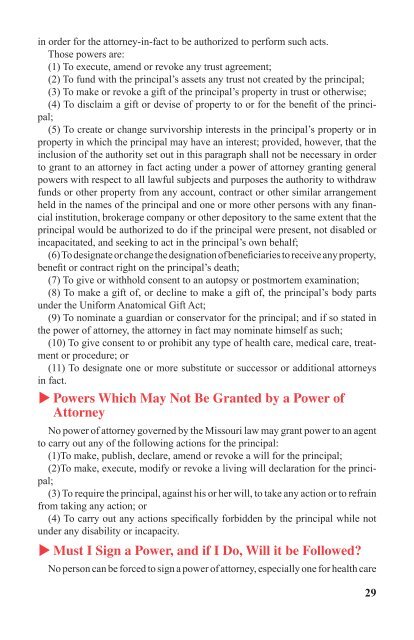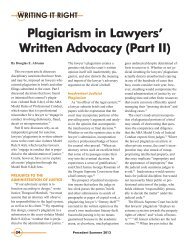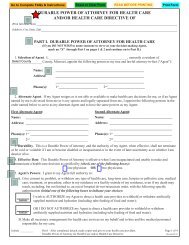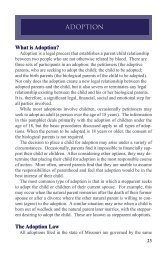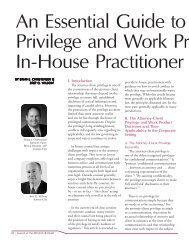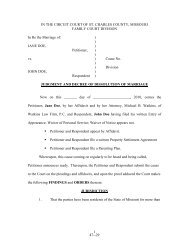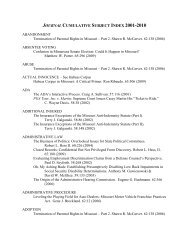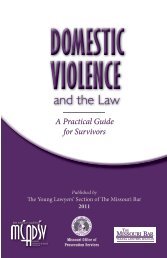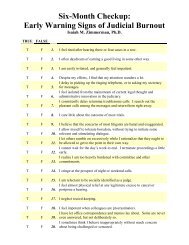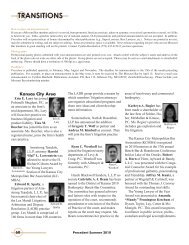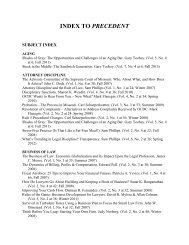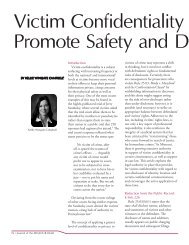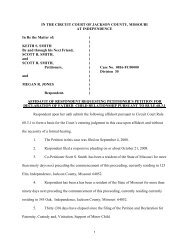Probate Law Resource Guide (PDF) - the Missouri Bar
Probate Law Resource Guide (PDF) - the Missouri Bar
Probate Law Resource Guide (PDF) - the Missouri Bar
- No tags were found...
Create successful ePaper yourself
Turn your PDF publications into a flip-book with our unique Google optimized e-Paper software.
in order for <strong>the</strong> attorney-in-fact to be authorized to perform such acts.<br />
Those powers are:<br />
(1) To execute, amend or revoke any trust agreement;<br />
(2) To fund with <strong>the</strong> principal’s assets any trust not created by <strong>the</strong> principal;<br />
(3) To make or revoke a gift of <strong>the</strong> principal’s property in trust or o<strong>the</strong>rwise;<br />
(4) To disclaim a gift or devise of property to or for <strong>the</strong> benefit of <strong>the</strong> principal;<br />
(5) To create or change survivorship interests in <strong>the</strong> principal’s property or in<br />
property in which <strong>the</strong> principal may have an interest; provided, however, that <strong>the</strong><br />
inclusion of <strong>the</strong> authority set out in this paragraph shall not be necessary in order<br />
to grant to an attorney in fact acting under a power of attorney granting general<br />
powers with respect to all lawful subjects and purposes <strong>the</strong> authority to withdraw<br />
funds or o<strong>the</strong>r property from any account, contract or o<strong>the</strong>r similar arrangement<br />
held in <strong>the</strong> names of <strong>the</strong> principal and one or more o<strong>the</strong>r persons with any financial<br />
institution, brokerage company or o<strong>the</strong>r depository to <strong>the</strong> same extent that <strong>the</strong><br />
principal would be authorized to do if <strong>the</strong> principal were present, not disabled or<br />
incapacitated, and seeking to act in <strong>the</strong> principal’s own behalf;<br />
(6) To designate or change <strong>the</strong> designation of beneficiaries to receive any property,<br />
benefit or contract right on <strong>the</strong> principal’s death;<br />
(7) To give or withhold consent to an autopsy or postmortem examination;<br />
(8) To make a gift of, or decline to make a gift of, <strong>the</strong> principal’s body parts<br />
under <strong>the</strong> Uniform Anatomical Gift Act;<br />
(9) To nominate a guardian or conservator for <strong>the</strong> principal; and if so stated in<br />
<strong>the</strong> power of attorney, <strong>the</strong> attorney in fact may nominate himself as such;<br />
(10) To give consent to or prohibit any type of health care, medical care, treatment<br />
or procedure; or<br />
(11) To designate one or more substitute or successor or additional attorneys<br />
in fact.<br />
▼<br />
No power of attorney governed by <strong>the</strong> <strong>Missouri</strong> law may grant power to an agent<br />
to carry out any of <strong>the</strong> following actions for <strong>the</strong> principal:<br />
(1)To make, publish, declare, amend or revoke a will for <strong>the</strong> principal;<br />
(2)To make, execute, modify or revoke a living will declaration for <strong>the</strong> principal;<br />
(3) To require <strong>the</strong> principal, against his or her will, to take any action or to refrain<br />
from taking any action; or<br />
(4) To carry out any actions specifically forbidden by <strong>the</strong> principal while not<br />
under any disability or incapacity.<br />
▼<br />
Powers Which May Not Be Granted by a Power of<br />
Attorney<br />
Must I Sign a Power, and if I Do, Will it be Followed<br />
No person can be forced to sign a power of attorney, especially one for health care<br />
1129


